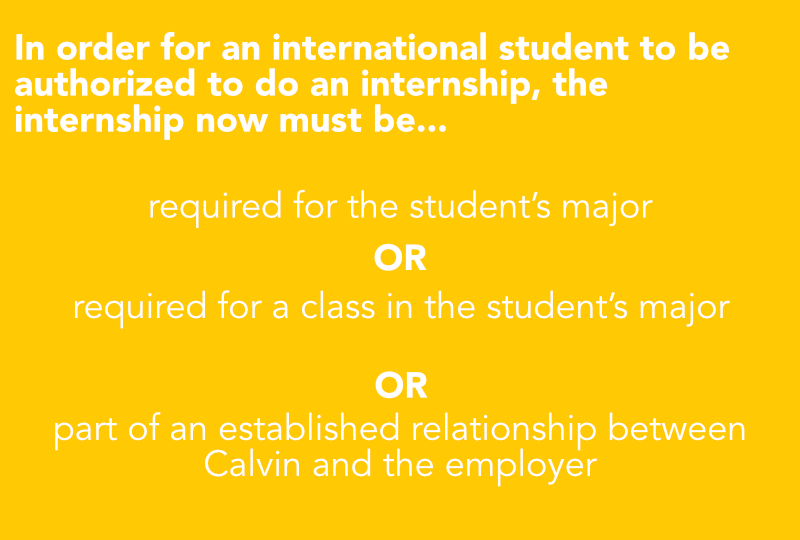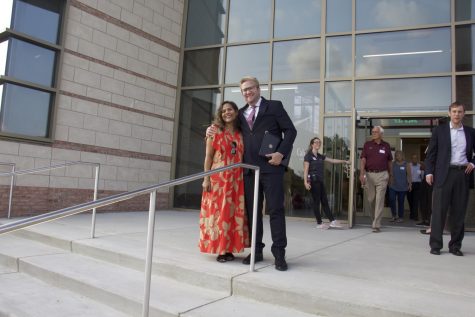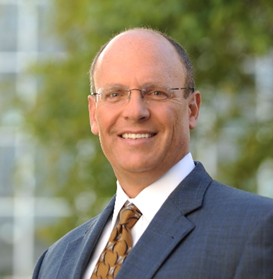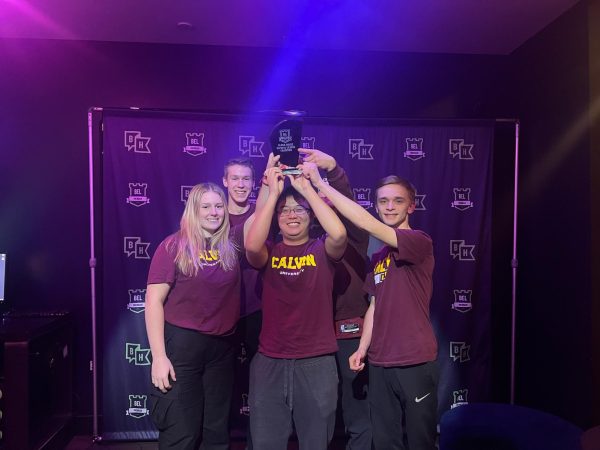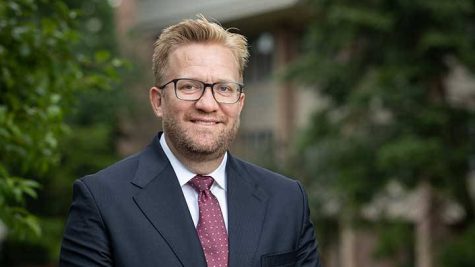Changes to internship requirements for international students sparks frustration, town hall
International students seek answers to new CPT policy.
This story has been updated with additional comments by Lauren Jensen
A room of faculty, staff, and students gathered on Friday, Nov. 8 because of a petition that landed on VP Sarah Visser’s desk earlier this semester. On Aug. 15, an email was sent to Calvin International students on behalf of Brent Wilkinson, immigration coordinator, that policy for Curricular Practical Training, an authorization for off-campus internships for international students, had been changed. Many international students were anxious and angry with this information.
Reading from their phone, one student notes that part of the email stated: “This update is in response to changes in government agencies and to the way they have been interpreting and enforcing US laws.” This unclear email left international students with more questions than answers. Would they be able to keep their internships? What would this mean for their four-year plan? Would their CPT get denied? Because internships and experience are required for many jobs, international students are worried that the new CPT policy will inhibit them getting an internship and therefore a job after graduation. The difference between an internship or not affects students’ futures. In response to this uncertainty, international students organized the CPT listening session.
During the session, Visser acknowledged the gravity of the situation and the concerns of students. The goal of the listening session was to listen to students’ concerns and questions in order to uncover solutions. Visser noted that administration was seeking to learn, understand, and figure out solutions.
Staff in the room included Visser, Jane Bruin, the assistant dean of international student development, Lauren Jensen, the vice president for enrollment strategy, Brent Wilkinson, immigration coordinator, Christina Edmondson, dean of intercultural student development, representatives from the Career Center, international admissions counselors, and academic deans.
Jensen began the discussion by framing the situation from her perspective and what she has learned about Calvin’s CPT policy. In fall of 2018, Calvin requested and underwent a program review that was not required by the government. This review was put in place to understand vulnerabilities in Calvin’s immigration policy and discuss recommendations for changes. International lawyers and other higher education institutions reviewed over 70 items in the policy. According to Jensen, the review found that Calvin should implement better processing and documentation, including recording the start/end date of internships and reasons for students leaving campus to participate in internships. According to Jensen, in 2012 Calvin was flagged for concerns in CPT practices and there were parts of the record Calvin would not want to be found if audited by the government. Jensen commented in a later email to Chimes that Calvin was flagged in 2012 for CPT during the regular recertification process by the Student and Exchange Visitor Program, which is a “government agency which oversees all educational institutions that host F-1 international students.” According to Jensen, “The flag was just a reminder of the regulations related to CPT, and Calvin adjusted its CPT policy in 2013. Calvin’s PDSO at the time contacted the SEVP recertification team on November 1, 2012 and was told that the ‘flagging’ was just a reminder to be in compliance and carried no legal consequences. Although the law itself has not changed since then, government agencies continue to interpret and enforce the law in different ways. Calvin was not flagged in subsequent recertifications in 2014, 2016, and 2018 (recertification happens every two years).” In addition, Jensen mentioned in her email that hundreds of higher education institutions across the United States have updated their policies over the last couple of years in compliance with the new CPT interpretations.
Wilkinson gave three reasons for Calvin’s change in CPT policy: the government continually changes the definition and interpretation of the policy, there is a contextually changing environment, and Calvin learned during the case that the university can’t have any vulnerabilities in the policy implementation. As Jensen notes, the changes in policy are to protect international students from employment violations, as this would harm their education. Jensen and Edmondson both said that the changing policy may seem harsh to international students, but with the current political climate and more checks happening at universities, it adds a layer of protection to the Calvin community.
Students take issue with the fact that students have to be enrolled in a class that require an internship or have a major requirement for an internship, which proves difficult for accepting summer internships. Four to five percent of students also do not have access to CPT, which the panel admits is a problem they are working to improve. Pre-health field international students also run into issues with the new CPT as there are not specialized classes for internships in pre-health programs at Calvin.
Students were uncertain if this is a government policy or a Calvin policy. The policy is up to interpretation, but the broadness is accompanied by policy guidance, as Wilkinson explains. According to the Designated School Official handbook, in order for a student to participate in CPT, the internship must be required for their major or the internship must be required for a class they are enrolled in. It must be “curricular” in the sense that a grade is recorded for the internship as part of a class.
Students concerned with summer internships were reminded of summer internship classes, but are still concerned with the cost that that poses. Both Visser and Jensen note that this is a barrier that needs to be addressed. It is a Calvin policy that the internship can begin two weeks before the course start date, and Wilkinson notes that there is flexibility with internships starting before a class begins. It was suggested that this be expanded to start several months before the class and be counted for the class in order for students to have summer internships. According to Wilkinson, further thought as to how this would be “curricular” would need to be discussed before implementation.
Several Calvin students at the listening session noted that the information was poorly communicated and this reflected on Calvin administration. Their employers noted that the policy was not updated on Calvin’s website, and the abruptness of the change caused them to ponder hiring Calvin students in the future. The lack of transparency to both students and employers posed a major problem.
Suggestions made throughout the listening session included creating a task force and working with Provost Cheryl Brandsen instead of contacting each academic department separately about internship opportunities with the new policy change. Another suggestion was creating a FAQ on the website in order for incoming students and current students to understand how CPT works at Calvin. As one of the three options for students engaging in CPT, Calvin is also looking into co-ops. While the listening session did not go into much detail about co-ops, they are essentially another way students can take an internship in a curricular group. Another suggestion at the listening session included adding an internship as one of several requirements to complete a course in order for the internship to be “curricular” as required by CPT. This would allow more flexibility for students.
Wilkinson encouraged students to reach out to him if they are struggling with understanding the CPT policy or have questions about their own situation. Calvin semester programs to DC and Chicago do count towards CPT despite what some students may have been told. Calvin is open to hearing of how other universities address the CPT regulations as they strive to clear the current situation by the end of the school year.




